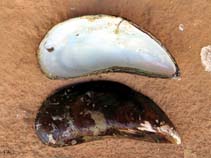Perna viridis (Linnaeus, 1758)
Asian brown mussel| Native range | All suitable habitat | Point map | Year 2050 |

|
| This map was computer-generated and has not yet been reviewed. |
| Perna viridis AquaMaps Data sources: GBIF OBIS |
Classification / Names Common names | Synonyms | CoL | ITIS | WoRMS
Bivalvia | Mytilida | Mytilidae
Environment: milieu / climate zone / depth range / distribution range Ecology
Benthic; brackish; depth range 0 - 100 m (Ref. 356), usually 0 - 20 m. Tropical, preferred 25°C (Ref. 107945); 46°N - 35°S, 20°E - 130°E (Ref. 348)
Distribution Countries | FAO areas | Ecosystems | Occurrences | Introductions
Indo-Pacific and Western Central Atlantic.
Length at first maturity / Size / Weight / Age
Maturity: Lm ? range ? - ? cm Max length : 16.5 cm SHL male/unsexed; (Ref. 348); common length : 8.0 cm SHL male/unsexed; (Ref. 348)
Short description Morphology
Shell elongate, roughly trigonal-ovate in outline, swollen and pointed anteriorly, rounded and compressed posteriorly. Umbones terminal and sharply tapering, rather incurved. Anterior margin reduced. Ventral margin long and often somewhat concave. Outer surface nearly smooth apart from concentric growth marks and faint radial lines. Periostracum rather thick and smooth, adherent. Ligamental ridge finely pitted. Hinge with 1 small tooth in right valve and 2 in the left. Anterior adductor scar absent in adult specimens. Posterior retractor scars large, confluent with the posterior adductor scar. Anterior retractor scar separated, elongate-ovate in shape, situated a short way to posterior end of ligament. Internal margins smooth. Colour: outside of shell whitish under a bright periostracum which is dark brownish green anteriorly and olive-green to bright green posteriorly. Interior an iredescent pale bluish green, with a vivid green margin on periostracum.
The figures from FAO comprise the production of Mytilus viridis from Malaysia and Singapore and also production reported under the name Mytilus smaragdinus from the Philippines and Thailand; they all refer to the same species (Ref. 348).
Life cycle and mating behavior Maturity | Reproduction | Spawning | Eggs | Fecundity | Larvae
External sexual fertilization. Spawning peaks coincide with monsoon seasons except in the Philippines and Thailand where spawning is year-round (Ref. 80527). Both sexes release gametes in the water column, where developed larvae remain for two weeks before settling in benthic habitat as juveniles. Sexual maturity occurs at 15-30 mm shell length, roughly 2-3 months age.
Main reference
References | Coordinator | Collaborators
Poutiers, J.M. 1998. (Ref. 348)
IUCN Red List Status (Ref. 130435: Version 2024-1)
CITES status (Ref. 108899)
Not Evaluated
CMS (Ref. 116361)
Not Evaluated
Threat to humans
Human uses
Fisheries: highly commercial
FAO - Aquaculture: production; Fisheries: landings, species profile | FishSource | Sea Around Us
Tools
More information
Trophic Ecology
Ecology
Population dynamics
Life cycle
Human Related
Aquaculture profile
Stamps, Coins Misc.
Stamps, Coins Misc.
Outreach
References
Internet sources
BHL | BOLD Systems | CISTI | DiscoverLife | FAO(Fisheries: species profile; publication : search) | Fishipedia | GenBank (genome, nucleotide) | GloBI | Gomexsi | Google Books | Google Scholar | Google | PubMed | Tree of Life | Wikipedia (Go, Search) | Zoological Record
Estimates based on models
Preferred temperature
(Ref. 115969): 24.8 - 29.2, mean 28.5 (based on 1030 cells).
Resilience
(Ref. 69278):
High, minimum population doubling time less than 15 months (K=0.17-2.37).
Nutrients : Calcium = 149 [71, 228] mg/100g; Iron = 8.53 [1.95, 15.11] mg/100g; Protein = 9.88 [8.64, 11.12] %; Omega3 = 0.313 [0.202, 0.423] g/100g; Selenium = 61 [50, 72] μg/100g; VitaminA = 0 μg/100g; Zinc = 2.04 [0.56, 3.51] mg/100g (wet weight); based on nutrient studies.



